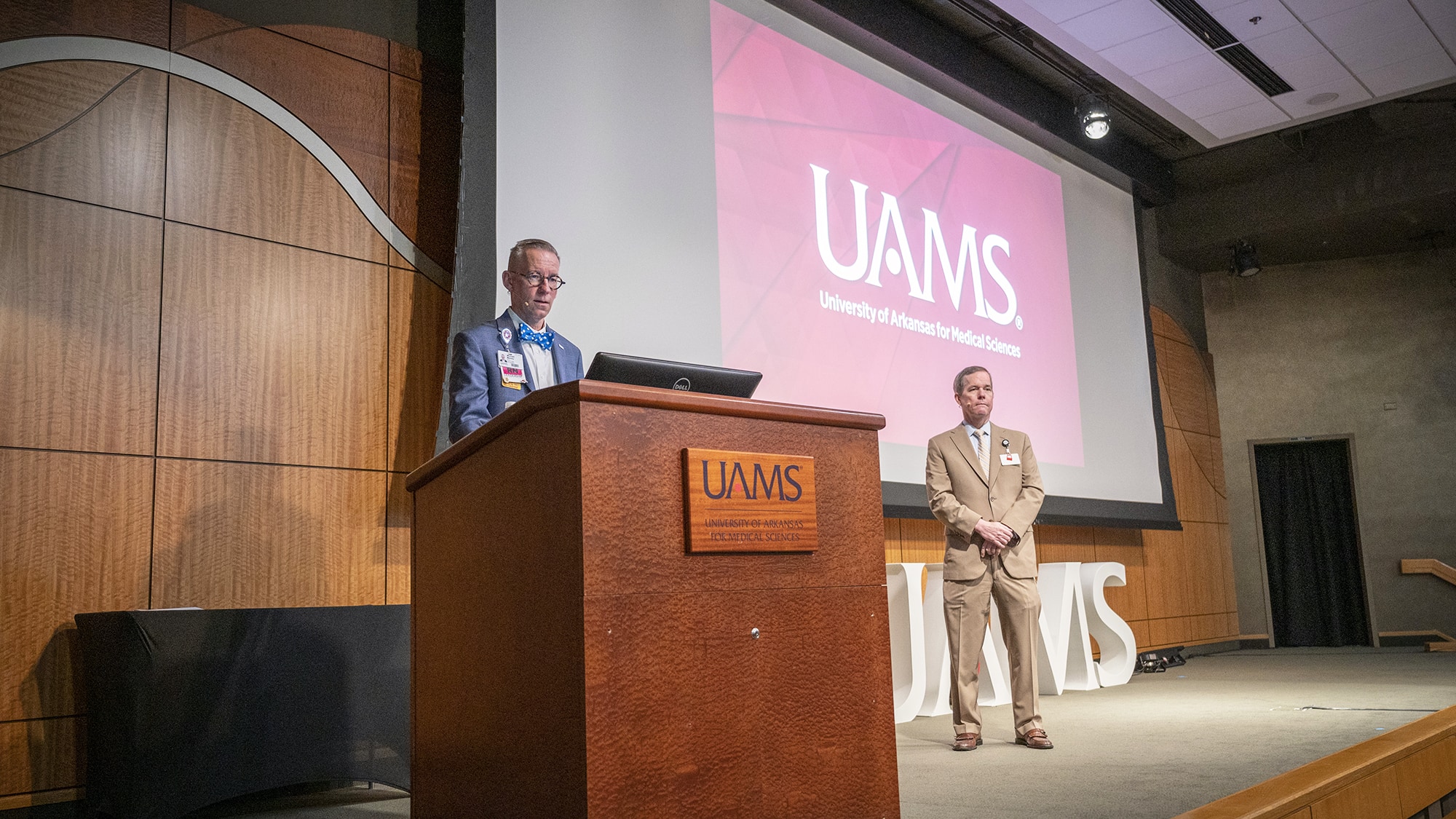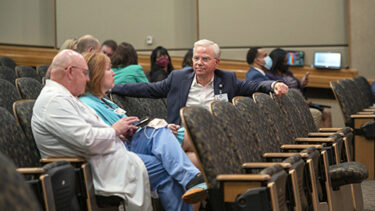View Larger Image

Chancellor Cam Patterson, right, listens as Michael Manley reads a question from a member of the Town Hall's online audience.
Image by Evan Lewis
New Programs, Progress Take Centerstage at Town Hall Meeting
| At the May 18 Chancellor’s Town Hall meeting, future plans and new initiatives took the spotlight away from the COVID-19 pandemic, which was the focus of many previous Town Halls.
The new Pathways Academy and development of a Donor ICU, an intensive care unit for organ donors, led off the meeting presentations.
Creating a more diverse scientific and medical community in the years ahead is one of the stated goals of the new Pathways Academy.
Watch video of the Town Hall meeting on May 18.
“The ultimate goal is to diversify the health care work force throughout Arkansas. Our holistic model also includes parents and students, UAMS and community partners,” said Shanea Nelson, Ph.D., who was introduced at the meeting as the academy’s director by Brian Gittens, Ed.D, MPA, vice chancellor of the UAMS Division for Diversity, Equity and Inclusion.
The UAMS Pathways Academy is an innovative, comprehensive educational and community engagement program focused on preparing low-income, K-12 students for educational and career opportunities in Science, Technology, Engineering, and Mathematics and Health care (STEM-H) disciplines.
Nelson said Pathways Academy first will focus on five pilot sites in Little Rock, Hot Springs, Pine Bluff, Springdale and Jonesboro. The initial curriculum theme is “The Good Life” with a focus on food and nutrition in cooperation with UAMS Culinary Medicine and the Winthrop P. Rockefeller Cancer Institute.
Nelson said some programs have already had their White Coat Ceremonies where students were officially recognized as Pathways Scholars.
“The stories that have come from these white coat ceremonies have been amazing,” Nelson said. “Teachers have been very grateful for Pathways Academy coming into their schools. They are not used to having programming like this within their communities. The students, parents and teachers are very excited about being a part of a community of scholars.”
Julius Balogh, M.D., MHA, followed Nelson with a presentation outlining plans for the organ donor ICU that will be the first of its kind in the United States for organ donation. Both brain dead and non-heart beating donors will be transferred to UAMS for resuscitation and procurement.
Balogh is the UAMS division chief of Anesthesia Critical Care Medicine, medical director of the Cardiovascular ICU and executive director of the Donor ICU.
A tremendous gap exists between the number of Arkansas patients needing organ transplants and the supply of donated organs, he said. To narrow that gap, UAMS is collaborating with the Arkansas Regional Organ Recovery Agency (ARORA) to create the new center.
“We have increased our organ donation quite a bit from 2020 to 2021,” Balogh said. “We are on track to surpass that this year. We do this for Arkansans around the state. We are lucky to have a single organ procurement organization and a single transplant center.”

Steppe Mette, UAMS Medical Center CEO, center, talks to Michelle Krause, second from left, and Ron Robertson, far left, in Smith Auditorium before the start of the Town Hall meeting.Image by Evan Lewis
Among the center’s goals are increasing the number of organs procured per donor, transferring every donor in the state to UAMS, starting a program that can keep organs warm by pumping blood through them (currently only six programs in the country do this) and leading in the development of organ management protocols.
Danielle Lombard-Sims, Ph.D., UAMS vice chancellor and chief human resources officer, briefed the audience on the progress of the new Employee Engagement Survey launched May 16.
“We can impact turnover. Retention is the best recruitment strategy,” Lombard-Sims said. “We are doing it nowbecause it has never been a more important time to hear the voices of our employees. We need to know how you’re feeling, and what we can continue to do to improve and be best in class and the best place to work in Arkansas.”
UAMS chose Gallup to assist the university in conducting the survey because of its ability to provide better measurements, analysis and to co-create engagement strategies to foster “the culture we want at UAMS,” Lombard-Sims said.
Preliminary results are expected in late July or early August for release sometime in late August or September. The release of the results will inform the creation of action plans for guiding the future development of the university and its work force.
“In Vision 2029, we made a commitment to salary equity and ensuring that all members of Team UAMS earn a living wage,” UAMS Chancellor Cam Patterson, M.D., MBA, said. “I am happy to report that the Arkansas Department of Higher Education has approved our ability to increase our minimum wage from $14 an hour to $15 an hour. This will begin July 1 and part of our commitment to you.”
A presentation by Christina Clark, MBA, UAMS chief operating officer, focused on the physical, on-the-ground development of the Little Rock campus.
She said final work is being concluded on the UAMS Boulevard and plaza projects. Crews are expanding the turn radius for vehicles crossing over 7th street from the boulevard.
Foundation work and pier drilling is under way on the 800-space Parking 4 deck just west of the boulevard. It is scheduled for completion in May 2023, Clark said.
Next spring, The Orthopaedic and Surgical Hospital near the south end of campus should be ready to open, and the new Radiation Oncology Center, which will also be the home of the state’s first proton therapy center. An alternative to radiation therapy, proton therapy is a state-of-the-art technology that uses a precisely focused high-energy beam to target tumors, often in hard to reach areas of the body and without affecting surrounding tissue.
During a question-and-answer session before the conclusion of the Town Hall, Amanda George, CPA, reported that through April, UAMS has a total financial loss of $2.5 million for the fiscal year. UAMS vice chancellor for finance and chief financial officer, George said some of that is a result of losses in investment income.
“If you back that out, we are almost $4.8 million on the plus side,” she said. “However, that includes $36M in ARPA and additional provider relief money that’s helped to offset our losses. That goes away next year, and we need to stay focused on improvements in efficiency and revenue to get ready for that.”